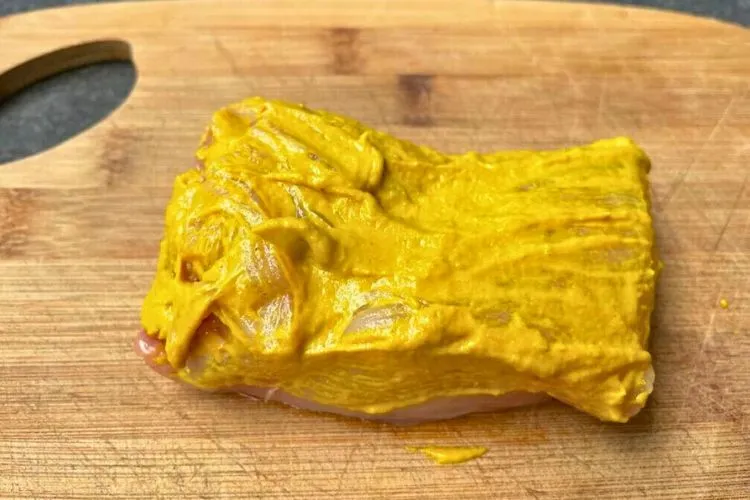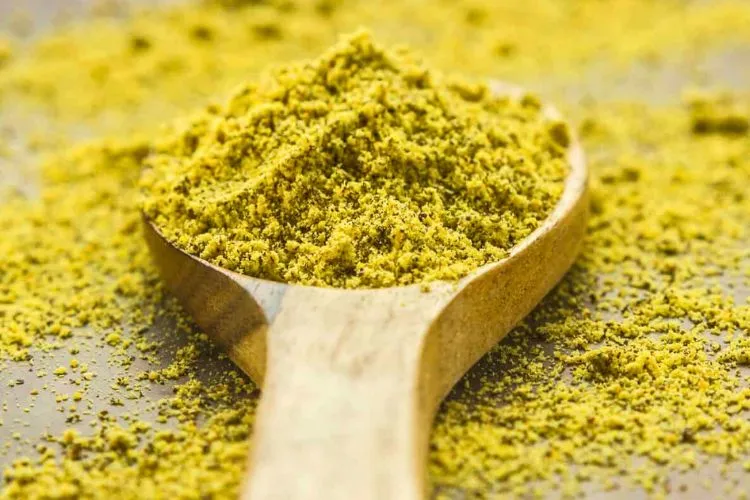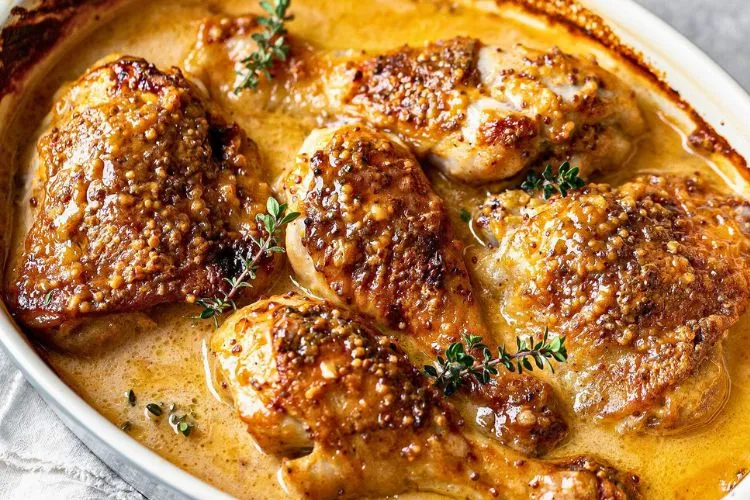Welcome to the culinary world of grilling where exceptional techniques can significantly enhance the flavors of your cherished dishes. One such technique is the addition of mustard to chicken before grilling. A staple of many kitchens, mustard’s transformative power on poultry may still be a mystery to some.
Our article delves into the art and science behind using mustard on chicken before grilling. Let’s check why put mustard on chicken before grilling? From its impact on taste and texture to the biochemical reactions involved, we explore why this humble condiment could be the secret ingredient to elevate your grilling game. Tune in and embark on this flavorful journey with us.

Why put mustard on chicken before grilling?
Putting mustard on chicken before grilling offers various benefits that can greatly enhance the overall flavor and texture of the dish. Here are the primary reasons to use mustard on chicken before grilling:
- Flavor enhancement: Mustard adds a tangy, sharp, and complex flavor to chicken that complements the natural taste of the meat. Its acidity cuts through the richness, while the spiciness enhances the chicken’s flavor profile, creating a delectable balance.
- Tenderizing: Mustard contains acids such as acetic and citric acid, which help break down the proteins in chicken, making it more tender and succulent. The time spent marinating allows the mustard to tenderize the chicken without overpowering its natural taste.
- Improved surface texture: The sugar content in mustard promotes caramelization and browning of the chicken’s surface. This yields a more appealing appearance and intense, smoky flavors from the Maillard reaction.
- Even seasoning: Mustard acts as a “glue” for other seasonings like herbs and spices to adhere to the chicken. This ensures even distribution of flavors and better seasoning penetration, ultimately leading to a more delicious, well-seasoned dish.
- Barrier against dryness: The mustard layer forms a barrier on the surface of the chicken, preventing excessive moisture loss during grilling. This results in a juicier, more tender final product.
In conclusion, applying mustard on chicken before grilling enhances its flavor, improves texture, facilitates even seasoning, and helps retain moisture. The combination of these benefits results in a more delicious, tender, and flavorful dish, making mustard an essential ingredient in your grilling arsenal.
What kind of mustard is best for rub?
Choosing the right kind of mustard for your rub greatly depends on the flavor profile you’re aiming for. Different varieties of mustard offer distinct flavors and complexities that can substantially enhance your dish. Here are some popular mustard varieties to consider when creating your rub:

- Yellow Mustard (also known as American mustard): This is a mild and less spicy variety, often used in barbecue rubs, particularly for smoking meats. Its mellow flavor allows the other ingredients in your rub to shine without overpowering them.
- Dijon Mustard: Originating from France, Dijon mustard is smooth, creamy, and has a sophisticated, sharp, and tangy flavor. It works well in rubs for chicken, pork, or fish and blends smoothly with a variety of herbs and spices.
- Whole Grain Mustard: This variety contains partially ground mustard seeds, providing a rustic texture and robust flavor to the rub. The seeds add a pleasing crunch and bursts of flavor to the meat.
- Brown or Spicy Mustard: Made from brown mustard seeds, this mustard variant has a profound heat and intensity. It’s ideal for recipes that call for a more potent mustard flavor and a spicy kick.
- Honey Mustard: For a sweeter touch, honey mustard blends the tang of mustard with the sweetness of honey, which can work especially well with chicken or pork.
Remember, the best mustard for your rub is the one that complements your recipe and personal taste preference. It’s always worth experimenting with different kinds and blends of mustards to find the perfect balance for your rub.
What’s the difference between Dijon mustard and deli mustard?
While both Dijon and deli mustard are popular choices for enhancing the flavor of food, they have different characteristics in terms of ingredients, preparation, texture, and flavor profile.
1. Ingredients and Origin:
- Dijon Mustard: Known for its origin in Dijon, France, this mustard is made from brown or black mustard seeds mixed with water, salt, and white wine or wine vinegar. The inclusion of wine gives Dijon mustard its distinct, smooth taste.
- Deli Mustard (also known as deli-style or brown mustard): This mustard is commonly used in delis across the United States. It’s primarily made from brown mustard seeds along with water, vinegar, salt, and other spices. Unlike Dijon mustard, deli mustard typically does not include wine.
2. Texture and Flavor:
- Dijon Mustard: After grinding, the seeds form a smooth, creamy paste. Dijon mustard has a sophisticated, mild, and tangy flavor. Its flavor complexity is contributed by the acidity of the wine, making it perfect for gourmet recipes.
- Deli Mustard: Its seeds are coarsely ground, resulting in a grainier texture, and it often has visible seeds. Deli mustard has a more pronounced heat and robust flavor compared to Dijon mustard, making it ideal for hearty sandwiches and bold meat dishes.
In summary, the main differences between Dijon and deli mustard lie in their ingredients, preparation method, texture, and flavor, with Dijon being smoother and milder, and deli mustard offering a grainier texture and bolder, spicier flavor.
Can you put mustard on chicken before baking?
Absolutely, mustard can be an excellent addition to chicken before baking. Here’s why:

- Flavor: Mustard gives chicken a tangy and complex flavor, adding a different twist to the taste.
- Crust formation: Mustard forms a light crust on the chicken when baked1, providing an extra layer of texture and delightful flavor.
- Marinade binder: Besides its unique flavor, mustard serves as a binder for other ingredients, helping them to adhere better to the chicken.
- Baking with other ingredients: Mustard can be combined with ingredients like garlic, thyme, rosemary, salt, pepper, and olive oil before it is smothered on the chicken and baked2. The same applies for ingredients like butter and honey.
- Recipe diversity: There are various recipes available that use mustard as a key ingredient before baking chicken, from ‘Mustard Baked Chicken Thighs’ to ‘Crispy Mustard Chicken.
In conclusion, using mustard on chicken before baking can result in a tastier, better-textured, and well-seasoned dish. It is, therefore, not only possible but recommended to put mustard on chicken before baking for these benefits.
You may also read: Best kabob grilling baskets | How Long Does It Take To Boil Chicken Wings Before Grilling?
Conclusion :
Applying mustard on chicken before grilling vastly improves the dish on multiple levels. By enhancing the overall flavor, promoting tenderness, creating enticing surface texture, evenly distributing seasoning, and retaining moisture, mustard proves to be an indispensable ingredient when grilling chicken.
The power of this simple condiment should not be underestimated, as it has the ability to elevate your grilling game and transform your chicken dishes into mouthwatering masterpieces. Incorporate mustard the next time you grill, and savor the tantalizing taste and textures delivered to your palate.


